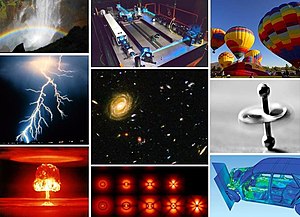भौतिक शास्त्र

भौतिका शास्त्र छगू प्राकृतिक विज्ञान ख गुकिलि छुं नं वस्तु[१] व उकिया स्पेस व ईलय् मोसन, व थ्व नाप स्वापू दूगु उर्जा व बल यात सीकेत स्वइ। [२] अझ वृहद कथं धायेगु खःसा थ्व विज्ञान ब्रह्माण्ड गथे सनाच्वंगु दु धका स्वयेत याइगु प्रकृतिया साधारण एनालाइसिस ख।[३][४][५] भौतिकशास्त्र छगू आधारभूत प्राकृतिक विज्ञान ख। थ्व विज्ञान प्रकृतिया सिद्धान्त सीकिगु ज्या नाप स्वापू दूगु विज्ञान ख। भौतिकशास्त्रं प्रकृतिया आधारभूत घटक (दसु पदार्थ, उर्जा, अन्तरिक्ष, व ई) व इमिगु आधारभूत अन्तरक्रियाया विश्लेषण याइ। नापं, थ्व विषयय् थन्यागु घटकतेगु ज्ञान कायेगु पद्धतिया विश्लेषण नं जुइ।
भौतिक शास्त्र धाःगु प्रकृतिया व्यवस्थित, आनुभविक सीकेज्या व थन्यागु सीकेज्यां लुयावःगु ज्ञान निता हे ख। भौतिक शास्त्रीया दकलय् महत्त्वपूर्ण ज्या धाःगु प्राकृतिक हलिंइ दयाच्वंगु प्यातर्नत (patterns) लुइकिगु व अन्यागु प्यातर्नतेगु आधारय् हलिं संकिगु आधारभूत नियम लुइकिगु ख।
भौतिक विज्ञानया ख्य:त
[सम्पादन]| शास्त्रीय भौतिकी | न्हुगु भौतिकी | व्यवहारिक भौतिकी |
|---|---|---|
|
|
|
|
|
|
|
|
|
|
| |
|
|
भौतिक शास्त्रया ख्यः थ्व कथं दु-
शास्त्रीय यान्त्रिकी
[सम्पादन]शास्त्रीय यान्त्रिकि वा क्लासिकल मेक्यानिक्स धाःगु भौतिक शास्त्रया छगू ख्यः ख। थ्व ख्यः व क्वान्तम मेक्यानिक्स जाना मेक्यानिक्स ख्यः दयेकि। मेक्यानिक्स धाःगु छुं नं वस्तुइ तिबःया प्रभाव सीकिगु दुसिका ख। थ्व ख्यःया छुं आधारभूत सिद्धान्त थ्व कथं दु-
- वेग
- प्रवेग
- संवेग
- तौल (मात्राय् गुरुत्वाकर्षणया प्रभाव)
- मात्रा
- तिबः
- गुरुवात्कर्षण (प्रकृतिइ दयाच्वनिगु ४गु मू तिबःय् छगू)
विद्युतचुम्बकत्त्व
[सम्पादन]जःसीका (Optics) व तरङ्ग वर्णक्रम (Spectrum)
[सम्पादन]- दप्लर प्रभाव
- एन्थल्पि
- एन्त्रोपि
- गिब्स फ्रि इनर्जी
- उर्जा
क्वान्तम मेक्यानिक्स
[सम्पादन]आणविक भौतिकि
[सम्पादन]लिधंसा
[सम्पादन]- ↑ Richard Feynman begins his Lectures with the atomic hypothesis, as his most compact statement of all scientific knowledge: "If, in some cataclysm, all of scientific knowledge were to be destroyed, and only one sentence passed on to the next generations ..., what statement would contain the most information in the fewest words? I believe it is ... that all things are made up of atoms – little particles that move around in perpetual motion, attracting each other when they are a little distance apart, but repelling upon being squeezed into one another. ..." R.P. Feynman, R.B. Leighton, M. Sands (1963). The Feynman Lectures on Physics.
- ↑ J.C. Maxwell (1878). Matter and Motion. D. Van Nostrand. “Physical science is that department of knowledge which relates to the order of nature, or, in other words, to the regular succession of events.”
- ↑ H.D. Young, R.A. Freedman (2004). University Physics with Modern Physics, 11th, Addison Wesley. “Physics is an experimental science. Physicists observe the phenomena of nature and try to find patterns and principles that relate these phenomena. These patterns are called physical theories or, when they are very well established and of broad use, physical laws or principles.”
- ↑ S. Holzner (2006). Physics for Dummies. Wiley. “Physics is the study of your world and the world and universe around you.”
- ↑ Note: The term 'universe' is defined as everything that physically exists: the entirety of space and time, all forms of matter, energy and momentum, and the physical laws and constants that govern them. However, the term 'universe' may also be used in slightly different contextual senses, denoting concepts such as the cosmos or the philosophical world.
| विकिमिडिया मंका य् थ्व विषय नाप स्वापु दुगु मिडिया दु: Physics |
